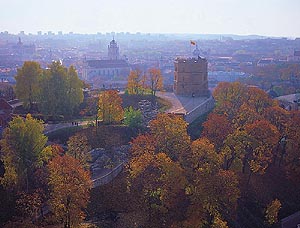 The international importance of Vilnius has been recognised by its
inclusion on UNESCO’s World Heritage list. The Old Town of Vilnius will be safeguarded,
revitalised and developed as the most important site of the Lithuanian heritage of
history, town planning, architecture and culture. Vilnius Old Town must be an inseparable
and integral part of the capital of Lithuania featuring ethnic tolerance, standards of
democratic life, and maturity of its civic society. The Old Town should become a living
exemplar of these aims, symbolising both the history of Lithuania and the resurgence of
Lithuania as an independent State.
The international importance of Vilnius has been recognised by its
inclusion on UNESCO’s World Heritage list. The Old Town of Vilnius will be safeguarded,
revitalised and developed as the most important site of the Lithuanian heritage of
history, town planning, architecture and culture. Vilnius Old Town must be an inseparable
and integral part of the capital of Lithuania featuring ethnic tolerance, standards of
democratic life, and maturity of its civic society. The Old Town should become a living
exemplar of these aims, symbolising both the history of Lithuania and the resurgence of
Lithuania as an independent State.
These aims can only be achieved if the Old Town develops into a vital civil community
with a buoyant economy. It should retain the traditional mix of capital city functions –
the seats of government and finance, together with national religious, cultural and
educational buildings – set in a matrix of dwellings housing a substantial residential
population supported by shops, schools and other local services.
These functions, all of which exist or are developing in the Old Town at the moment,
should be intensified by restoring to use derelict and empty structures, and by infilling
vacant sites resulting from demolition after the Second World War with well designed new
buildings.
In addition the unique urban form of the Old Town – the remnants of fortifications,
narrow medieval streets, the scale and detail of the buildings – must be respected and
enhanced, with tight controls on traffic and parking, and extended pedestrianised areas.
The growth of economic activity and prosperity may provoke conflicts between competing
functions. Whilst tourism and recreational uses may be important levers for economic
development, they must not be allowed to dominate the Old Town. The Municipality will
require to take the initiative and give a clear lead in managing the revitalisation
programme, working in close collaboration with the local business and residential
community. Heritage preservation and the needs of residents must be balanced with those of
businesses and visitors. This management will best be achieved through a dedicated
independent local agency bridging public and private interests, and by appropriate
mechanisms put in place to resolve the differences of interest in an equitable and
transparent manner. Through this process the local community can be encouraged to take an
active role in the future development of the Old Town.
The revitalisation of the Old Town is not an isolated task in itself. The Old Town has
a vital part to play in the reshaping of the city of Vilnius for the 21st century, and in
the cultural and economic future of Lithuania.
 The international importance of Vilnius has been recognised by its
inclusion on UNESCO’s World Heritage list. The Old Town of Vilnius will be safeguarded,
revitalised and developed as the most important site of the Lithuanian heritage of
history, town planning, architecture and culture. Vilnius Old Town must be an inseparable
and integral part of the capital of Lithuania featuring ethnic tolerance, standards of
democratic life, and maturity of its civic society. The Old Town should become a living
exemplar of these aims, symbolising both the history of Lithuania and the resurgence of
Lithuania as an independent State.
The international importance of Vilnius has been recognised by its
inclusion on UNESCO’s World Heritage list. The Old Town of Vilnius will be safeguarded,
revitalised and developed as the most important site of the Lithuanian heritage of
history, town planning, architecture and culture. Vilnius Old Town must be an inseparable
and integral part of the capital of Lithuania featuring ethnic tolerance, standards of
democratic life, and maturity of its civic society. The Old Town should become a living
exemplar of these aims, symbolising both the history of Lithuania and the resurgence of
Lithuania as an independent State.